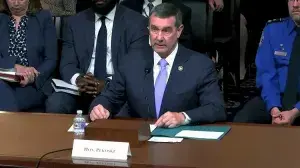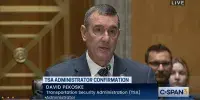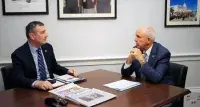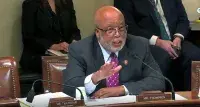
With fair pay a top priority, 2023 was a watershed year for TSA.
The agency’s new pay plan took effect last summer to bring TSA employees in line with their colleagues across the federal government.
Helping make that happen was TSA’s Legislative Affairs (LA) team.
“Getting funding in the Fiscal Year (FY) 2023 Omnibus Appropriations Act was the biggest legislative achievement in TSA’s history,” proclaimed Legislative Director Grace Bergin. “That had been TSA’s top legislative priority since the beginning of Administrator David Pekoske’s first term and was achieved by a lot of teamwork and hard work between various offices within TSA including Enterprise Support/Human Capital, Chief Counsel, the Chief Finance Office, Strategic Communications and Public Affairs, DHS leadership, and many more.”
With the federal government under another continuing resolution, extending TSA FY23-level funding through March 8, Bergin said LA’s top priority is for Congress to annualize TSA’s new pay plan moving forward.
“We worked very closely to brief Congress on the pay plan and answer congressional inquiries and requests for information,” Bergin noted.
Bryan Dvorak, the Law Enforcement/Federal Air Marshal Service (LE/FAMS) liaison to Legislative Affairs, said LA played a significant role in the new compensation plan and still does since Congress hasn’t yet reached an agreement on the FY24 budget.
“LA worked in tandem with the Chief Finance Office to explain to members of Congress and their staffs the importance of pay equity to every member of TSA’s workforce,” said Dvorak. “Our efforts were bolstered by TSA federal security directors, screening officers, and every member of TSA’s vast workforce when their stories were shared with congressional members as they traveled through TSA checkpoints. It has been the most important line of effort since my time serving in LA.”
Dvorak said LA was very influential but needed everyone from the Administrator down to share their stories and explain the human impact of paying our employees at the comparable levels of our federal counterparts.
“We partnered with Human Capital to ensure consistency of messaging and support when briefing Congress,” Dvorak said.
“Additionally, one of our biggest priorities is to end the diversion of the aviation passenger security fee, a large portion of which is going to the U.S. Treasury for deficit reduction, so the money collected in fees can go to TSA and be used as it was originally intended – for aviation security purposes,” Bergin said.
Dvorak believes TSA has made leaps in working with Congress to explain how Congress needs to return the security fee to funding transportation security rather than working to pay down the national debt.
“The Administrator has been working with LA and members of Congress to explain the situation and trying to find a legislative solution to provide funding for security technology,” emphasized Dvorak.
LA’s partnership with Congress runs deep. Securing funding for all agency programs, including new technology and programs to further enhance security for all modes of transportation –aviation and surface – in the U.S. and globally, is always on their minds.
Bergin said one of TSA’s ongoing most significant legislative priorities is to secure consistent and dedicated annual funding for checkpoint security technology.
“While not lobbyists, LA’s responsibilities are to be the conduit between Congress and TSA, advocating for TSA’s legislative priorities,” said Bergin. “We interact on a daily basis with congressional staff, who are the engines that make Congress run. Most engagement with members of Congress takes place during congressional hearings, member briefings, and when the Administrator meets with a member.”
She said LA’s role in being the liaison with Congress is “to know a little bit about a lot of things and to know the subject matter experts within TSA who we need to reach out to for answers to congressional questions, inquiries, and requests.”
LA also takes the lead to coordinate all information Pekoske and other senior leaders may need for congressional hearings and briefings.
“Our goal is to ensure the witness has enough information to respond to questions from members while advancing the priorities,” explained Dvorak.
In the past, Dvorak has been responsible for coordinating and producing enough information to fill a 300-plus page briefing binder. In addition, he said the LA team responds to emails and offers site visits to members of Congress and their staffs who serve on TSA and DHS authorization committees.
“By providing congressional staff with our review, we assist the member in introducing legislation which is more in line with our resources and priorities,” he said.
Bergin and Dvorak both view TSA’s connection with Congress as a critical partnership.
“TSA has a wonderful, strong working partnership with Congress, which is vital for the agency,” said Bergin. “TSA is dependent on congressional authorization and appropriations (funding). Congress determines how much money we get and what it can be used for.”
Dvorak added, “TSA and Congress work hand-in-hand to ensure a secure and equitable transportation system for people and goods. We work with Congress to provide information on how TSA can be best positioned to complete our mission, while Congress works with TSA in their oversight capacity to ensure we are fulfilling our duties to the traveling public. We have a partnership based on the same goal – protecting the nation’s transportation systems to ensure freedom of movement for people and commerce.”
Dvorak calls it an honor to serve in this unique position with LE/FAMS and LA.
“I have a perspective of TSA only few other positions can provide,” he said. “I hope to use what I have learned in Legislative Affairs to continue advocating for TSA priorities throughout my career.”
One of Bergin’s favorite parts of the job is communicating and cultivating close relationships with Congress to “try to teach them about TSA’s priorities, needs, mission, and vision.”
“I want to thank the entire LA team for their tireless work on behalf of TSA,” she said. “We are a small but mighty office, and the work LA does is vital to the success of the agency.”
By Don Wagner, TSA Strategic Communications & Public Affairs



